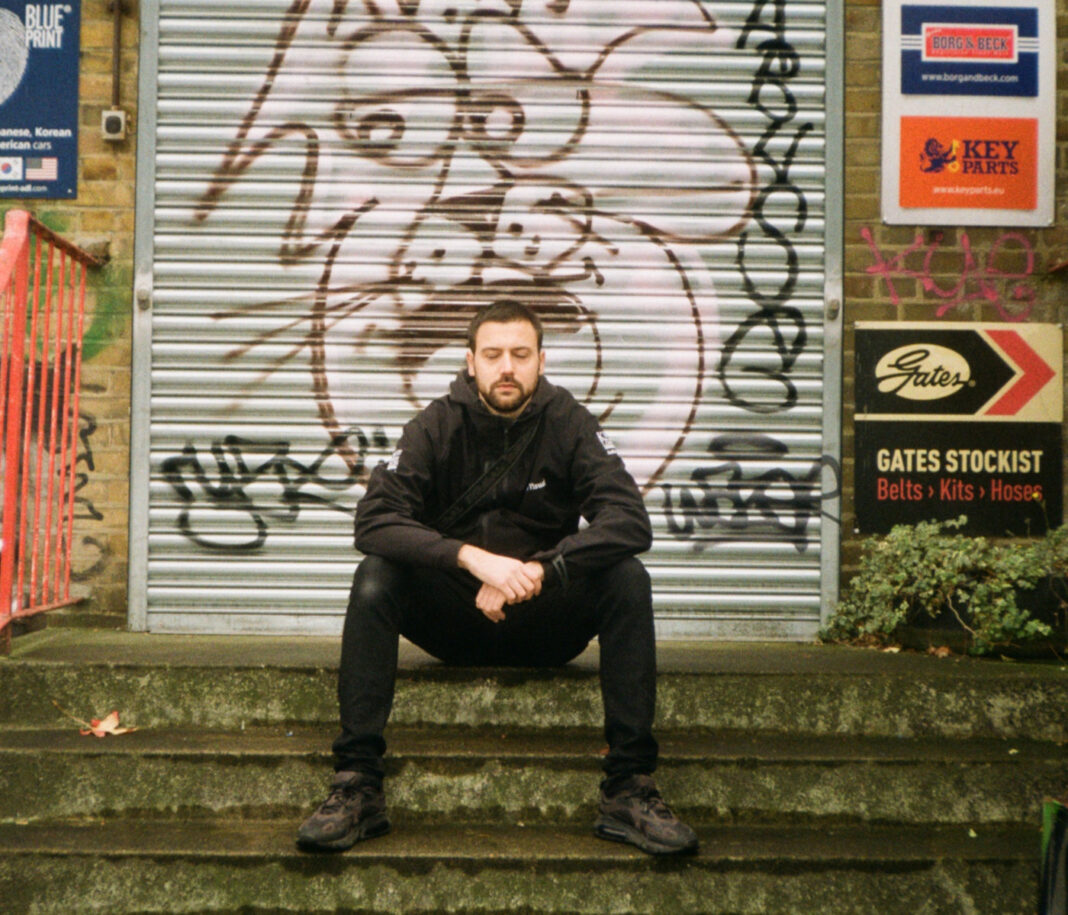
Photo: Press (Soreab)
Dario Picchi has been incredibly prolific under the Soreab moniker in recent years, putting out bass-heavy and refreshingly unconventional releases on labels like Accidental Meetings and Control Freak while also co-running the Baroque Sunburst imprint together with fellow producer Big Hands. Apart from numerous collaborations with a broad range of artists such as MCs like Parallax or Logan and percussionist Cinna Peyghamy, he has also self-released Muǧla’s Chronicles last year, his (somewhat belated) debut album. While he’s getting ready to leave his mark on London’s club scene with a new event series—more on that later—as well as putting out a new record on Avian soon, the Italian-born producer’s mix for our Groove podcast takes things slowly—kind of, at least.
You have been living in the UK for years, but are originally from Tuscany. When and how did you get into electronic music?
I got into electronic music when I was about 16 or 17 years old. In Italy that’s the time when all teenagers start going to clubs more regularly. From there on, I started from the commercial and garish sounds and then I slowly started being more selective and created my own path in terms of personal taste and interests. Surely being born and raised in a region like Tuscany was influential in terms of electronic music because of its musical history. In the 1990s, it was home to clubs like Insomnia, Jaiss and Tenax. It helped me to put down the roots on my melodic and trance influences. I discovered electronic music thanks to this scene which was already important before I was born and it was still fundamental for a generation like mine—I was born in the 1990s. For example, I was only able to attend Insomnia when it reopened under another name at the end of the noughties. In addition to the new minimal techno wave—e.g. labels like Cocoon and M_nus—there were also resident DJs such as Francesco Farfa, Gabri Fasano and Alex Neri of Planet Funk fame, to name a few. Seeing these people playing was fascinating, especially the fact that they touched all these buttons. They seemed pilots.
How did it come about that you picked up DJing and producing?
For the same reasons I described above: I was fascinated by DJing! After I turned 18 years old, I started to be part of a crew of friends with whom I organised parties in my local area and we played in clubs’ second rooms around Tuscany. From there on, I learned more about other artists from Chicago and Detroit who came to play in my region. I come from a small provincial town of 500 people and partying and playing around with friends was the only way to get out of that ecosystem. But then, at 19 years old, I realised that even that environment was restricting me and I wanted to broaden my horizons. So I chose to take another route starting from zero in a city like London, as I had the feeling that it could give me something in terms of experience but also at an artistic level. Once here, I started a Music Production and Sound Engineering course. And this is how I began my second life and my journey as a producer.
You notably picked up speed after relocating to London. Would you say that the city had an influence on your musical path?
It was very traumatic at the beginning! Just think about a provincial boy who finds himself in the chaos of a city like London. But it helped me wake up. There are so many things happening on a daily basis and this served as material to express myself artistically. It also gave me the freedom to vent in a creative way, especially on a therapeutic level.
You’ve self-released your debut album Muǧla’s Chronicles last year, but the material was actually written in 2016 as a kind of „diary“ while you were living in the region that gave the record its title. What brought you to Turkey in the first place and what was it about your life there that inspired you to produce these tracks?
I lived in Turkey for six months on a sound engineering job. Before that I only had some temporary jobs in hospitality (I wasn’t born rich lol). My stay there served as a detox from London … I isolated myself from the rest of the world and, in my free time, started working on Muǧla’s Chronicles, for which the everyday life was my inspiration. Therefore, I thought of compiling the tracks as if they were a diary in which I documented what happened every day through music.
As a nod to the country’s traditional music, you worked with the sounds of the bağlama, albeit in an abstract form. Why were you so keen on integrating the lute into your music?
I was so keen on that because it was a new thing to experiment with. I heard it the first time in (the Muǧla harbour city of) Bodrum from a boy who was playing it among stray dogs in the street whilst people paid no attention. I had this memory in my mind when I recreated the sound of the saz in order to use it as the backbone of the album … In the end, I identified with that boy. I felt like him while he was learning to play that instrument for the first time, managing to create something with it and finally taking it out on the „street.“
Your latest EP for Brighton’s Accidental Meetings, Perspectives, includes a track featuring the MC Logan. You’ve worked with vocalists before, for example for the title track of 2019’s Wrinkles with Parallax. What draws you to collaborating with MCs?
I learned more about grime while living in London, especially during my time in E3, around Roman Road Market, where I’m still based. I’ve always had an inclination towards rap music from a very young age because I really liked writing rhymes even though I’ve never spat some bars. With Parallax it all started out for fun, he was very attached to US American hip-hop, so I proposed him to do something more crossover that gives a nod to the club but is in some way more compatible with the English culture of rap, grime, and UK techno with an industrial tinge that comes from my first three years in London spent in squats and illegal raves. The track with Logan came up when I sent demos to Accidental Meetings, including a beat which they liked. They looked for an MC who could fit it and could spit something on top of it—big up Lucien and Sholly!
For the Teleportation EP on Control Freak, you teamed up with „modular percussionist“ Cinna Peyghamy. How did you get to know Peyghamy and what did your working process look like?
As with MCs, I always like to take my music into other directions. And this is why I also enjoy collaborating with other artists from time to time. I wrote to Cinna a few months after his collaboration on his joint Livity Sound EP with Azu Tiwaline. It was a period in which I strongly felt the need to have another perspective on percussion since that is one of the main elements of my music. In fact, this obsession with percussion is part of my childhood: my father used to make me listen to Brazilian music when he returned from his work trips from Brazil. I always tend to record the rhythmic patterns in the most organic way possible because they derive from my personal and field recording samples and then I arrange them afterwards in Logic instead of using drum machines and digital VSTs. It was very interesting and fun to work with Cinna’s recordings, rearranging them, doing some live overdubs and building a melodic progression on top of it all while remaining faithful to my sound.
You’re the co-founder of the Baroque Sunburst label, cheekily promising „sonic welfare from around the world.“ What philosophy do you follow with the imprint?
Since we started the label with Andrea a.k.a. Big Hands, we have always followed the philosophy of promoting and releasing music that doesn’t follow certain standards. This is our idea of „sonic welfare“ and it’s something that we seek and it’s open to everybody worldwide: our latest compilation release features four artists from different scenes around the world.
What was the idea behind your mix for our Groove podcast?
My idea for this mix was to play half-time music which I’ve gotten more into over the last year because it’s a BPM range that gives you the ability to play a lot with dynamics and intensity with more fun. I’ve selected and played music from artists that I really respect and enjoy supporting if I get the chance to.
Last but not least: what are your plans for the future?
Besides making more music and releases—my next release will be a six-tracker on Avian, big up Shifted!—I would like to find the determination to prepare a hardware/DAW-less live set and build a live project that involves more people. With other friends such as Kouslin and KRSLD, I will start an event series meant to provide a platform for forward-thinking bass-heavy and percussive music with no BPM limitations. The first edition will take place on the 17th of March at The Waiting Room, Stoke Newington London.
Stream: Soreab – Groove Podcast 367
0.1 Fatwires – Foundation Haze
02. McGregor – fuse_0xe5(d1)
03. CO2 – X25
04. Orree vs Big Hands – Toledo
05. Ausschuss – True Partner
06. Soreab – Insomnias
07. Slacker – Slither
08. Formant Value – Orb
09. Paracusia – Signals
10. Low Key – Protomagias Riddim
11. KRSLD – unreleased
12. Ehua – Ecnelis
13. Mick Harris – The Back Roads
14. Morwell – Channels
15. Arcane & Jon1st – Fool’s Gold
16. Siu Mata & Amor Satyr – Is This All Real
17. Kouslin – Five Four
18. Air Max 97 – Testrip
19. The Untouchables – Forbidden Thoughts
20. Sister Candy – Keep Bubbling (DJ Sports Remix)
21. Worli – Dynamo (Etch Remix)
22. Hidden Element – The Wall
23. Giordano – Friction
24. Notte Infinita – Atmosfera
25. Worli – Breath-Dance
26. Sierra Romeo – Gong 603
27. Nicolo’ – Adapting to a different system not using technology
28. Feloneezy – Celia




